news
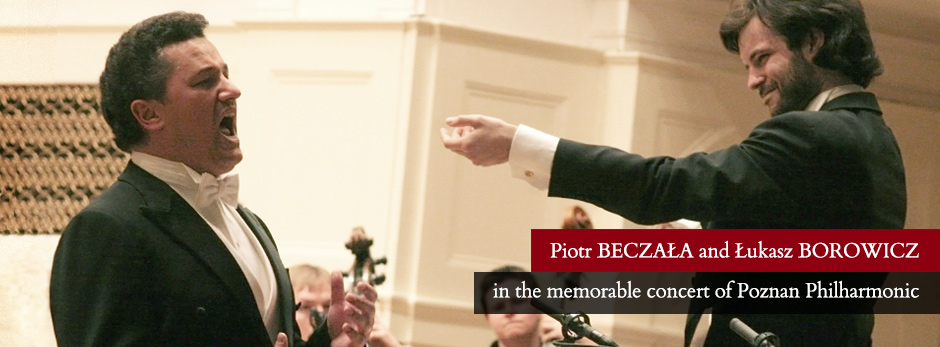
This was his first gala concert in Poland. In the Poznan Philharmonic. Piotr Beczała sang on the 14th of April 2007 in AMU Concert Hall during the concert of the cycle “World Opera Stars” and… he enchanted everybody! Poznan Philharmonic Orchestra was conducted then by Łukasz Borowicz.
Today Piotr Beczała, world-renowned tenor and the brilliant conductor Łukasz Borowicz, Chief Guest Conductor of Poznan Philharmonic Orchestra are among the nominees for this year’s Public Media Award in the category of Music.
Before the results are announced late in the evening (10:45 p.m., Polish Radio Program I, TVP1 and TVP Polonia), at 7:30 p.m. on the air of Polish Radio Program II, in the framework of Poznan Philharmonic, there will be a rebroadcast of this unusual concert from years ago with the participation of both heroes. It will be an opportunity to bring back memories, as well as for new artistic thrills.
The concert of the Polish Radio Program II Philharmonic will be hosted by editor Róża Światczyńska.
After the concert we encourage you to check our Q&A cycle featuring Piotr Beczała, his wife Katarzyna Bąk-Beczała (here) and Łukasz Borowicz (here).
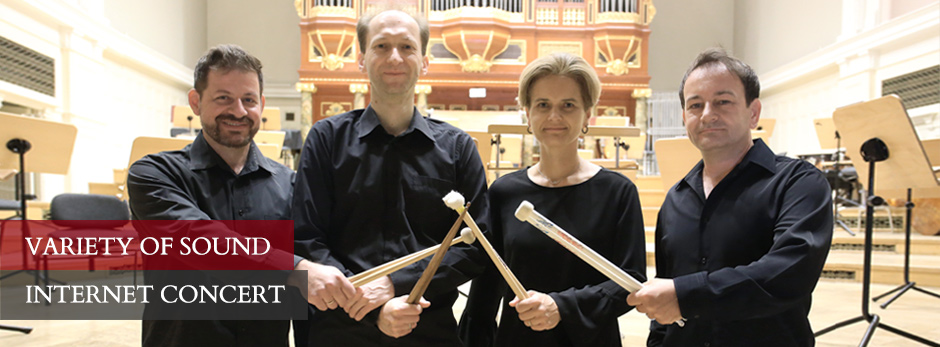
Tomorrow, on the 13th of November at 7 pm we invite you for the Internet Concert of Poznan Philharmonic. This time the Percussionists of Poznan Philharmonic Orchestra will present themselves to the music lovers in the foreground, in the full artistic display. Grzegorz Siek, Jerzy Mackiewicz, Beata Słomian and Piotr Sołkowicz prepared a special program which perfectly expose their abilities and the possibilities of the instruments they play.
During the concert the listeners would have an opportunity to discover the sound of the percussion instruments and the whole range of their potential. This time percussion instruments form a separate ensemble. In the presented works you will be able to hear lilting marimba themes, rich snare drum sounds, as well as sonoristic effects resulting from fusing the vibraphone with other instruments.
The Philharmonic musicians have chosen the works by contemporary authors: American percussionist, composer and pedagogue Mitch Markovich, German composers Berthold Hummel and Eckhard Kopetzki and a Canadian John Thrower, who dedicated his piece “Aurora Borealis” presented by our artists to Katarzyna Myćka, Polish (coming from the region of Greater Poland) marimba virtuoso.
PERFORMERS:
Poznan Philharmonic Percussionists Ensemble:
- Grzegorz SIEK
- Jerzy MACKIEWICZ
- Beata SŁOMIAN
- Piotr SOŁKOWICZ
PROGRAM:
- Mitch Markovich, Teamwork for Quartet
- Berthold Hummel, Fresken 70 (Fifth movement: Finale – konklusion)
- John Thrower, Aurora Borealis (movement “Starry Night”)
- Eckhard Kopetzki, Le chant du serpent
***
Co-financed from funds of the National Cultural Centre under the program “Culture on the Net”.
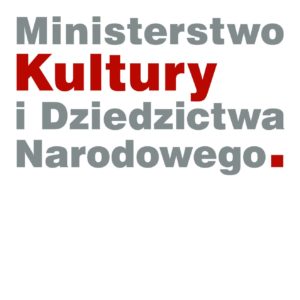
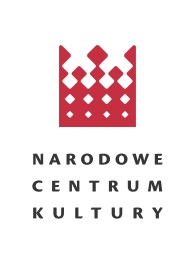
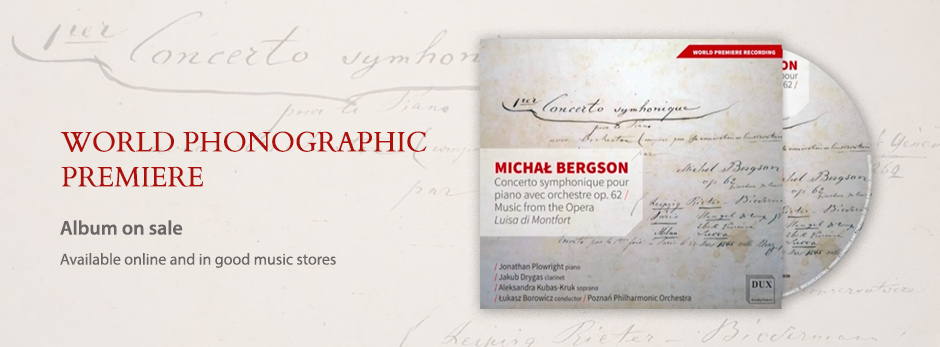
The album’s origin slighty resembles the discovery of new worlds. One day Jonathan Plowright, a prominent British pianist, comes across the manuscript of Michał Bergson’s “Concerto symphonique pour piano avec orchestre”, Op. 62 in a London antiquarian bookshop. And as Polish music occupies a special place among numerous passions of the artist, his discovery intrigued Poznan Philharmonic with the Orchestra of which he performed a number of times. The Philharmonic purchased the script and decided to record the piano concerto, as well as enrich the album with other works by Michał Bergson. This way “Michał Bergson. Concerto symphonique pour piano avec orchestre, Op. 62 / Music from the Opera Luisa di Monfort” became the next world phonographic premiere in the discography of Poznan Philharmonic Orchestra.
Besides the titular Concerto symphonique the album comprises also Mazurkas (No. 1 and No. 4 from Op. 1 “Polonia! Mazurka pour piano”), Grand polonaise héroïque as well as the excerpts of the composer’s Opus Magnum: four-act opera “Luisa di Monfort” (introduction to the opera, scene and aria for solo clarinet and orchestra, Il Ritorno for soprano and orchestra).
The recordings by Jonathan Plowright (piano), Jakub Drygas (clarinet), Aleksandra Kubas-Kruk (soprano) and Poznan Philharmonic Orchestra conducted by Łukasz Borowicz were done in the Aula of Adam Mickiewicz University in Poznań, the Concert Hall of Poznan Philharmonic.
The latest album of Poznan Philharmonic was released by DUX label and is available in good music stores and on www.dux.pl.
Due to the second pandemic wave and the actions undertaken to limit the spread of the SARS-CoV-2 virus the Government Crisis Management Team decided to close cultural institutions for the audience. The restrictions take effect from the 7th to the 29th of November 2020. For that reason Poznan Philharmonic suspends planned concerts till the 29th of November 2020.
We would like to inform that the concerts VIOLIN AND A… HEN from z cycle BEETHOVEN OUR CONTEMPORARY, planned for the 5th and 6th of November 2020, have been rescheduled by the Poznan Philharmonic to the 18th and 19th of February 2021 due to the current epidemiological situation.
We would like to inform that the concert DOUBLE BASS AND… BEAR has been rescheduled to the 15th of January 2021. We are sorry for the postponement.
On the 23rd October 2020 ticket office is closed.
From the 26th of October 2020 the ticket office of Poznan Philharmonic (AMU Concert Hall, Wieniawskiego Street 1) will be open only on Thursdays and Fridays from 1 p.m. and 5 p.m., as well as an hour before the concerts.
Due to the pandemic, this year’s Ludwig van Beethoven Easter Festival, scheduled for April, is held in autumn. However, even in this season it’s hard to imagine it without a cycle dedicated to forgotten opera works, the spiritus movens of which is our Chief Guest Conductor, Łukasz Borowicz. It is also difficult to visualize that cycle without Poznan Philharmonic Orchestra. We are glad that during this year’s edition of the Festival another great work – Faniska by Luigi Cherubini – will be presented in the National Philharmonic in Warsaw. It will be its first performance in… 160 years! Prominent singer soloists, Poznan Philharmonic Orchestra and Poznan Chamber Choir prepared by Bartosz Michałowski will perform under the baton of Łukasz Borowicz.
As Maestro Łukasz Borowicz notices, Ludwig van Beethoven, the patron of the Festival, highly valued Cherubini. He even attended the Viennese premiere of Faniska. What’s more, it is the same opera that inspired Beethoven to write Fidelio.
Poznan Philharmonic Orchestra along with the soloists and Poznan Chamber Choir have just completed the first ever recording of Faniska, which will be available later this year.
You can watch the online broadcast of the concert on the channel of Polish Radio or listen to it on Polish Radio Two.
Tuesday, 20th of October, 7:30 p.m. We highly recommend it!
The performers dedicate today’s concert at the 24th Ludwig van Beethoven Easter Festival in the Warsaw Philharmonic to the memory of Wojciech Pszoniak.
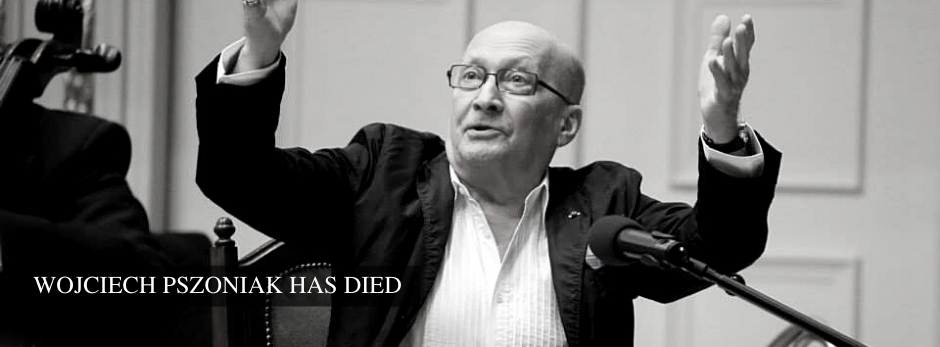
We all adore his roles in such films as “The Wedding”, “The Promised Land”, “Danton” and “Korczak” by Andrzej Wajda or “Austeria” by Jerzy Kawalerowicz, numerous theatre and film performances. And yet the brilliant actor, when he was an adolescent, wanted to become a musician. He had family traditions – his grandfather and his mother played the violin. It was the first instrument he took up in his musical education. He also learned to play the oboe and the clarinet. He was in a military band and in an opera orchestra. Then the studies in the Theatrical Academy in Cracow began as well as acting, to which he devoted his life. He didn’t give up music, though – to the list of the instruments he mastered he added the saxophone (he used this skill in films and theatre plays), and a few years ago he started learning to play the cello.
We were lucky that the Artist was friends with Poznan Philharmonic. He appeared on the stages of AMU Concert Hall and the auditorium of National Philharmonic a few times, taking part in our concerts, which he enriched with his narration. We applauded him i.a. in “Der Bürger als Edelman” by Richard Strauss, “Djamileh” by Georges Bizet or “Lélio, or the Return to Life” by Hector Berlioz… Not so long ago – in May this year – he was our guest in the Q&A cycle presented in our YouTube channel and Facebook profile… To find out what he said about life and art in response to the questions of our listeners check HERE
It is with great sorrow that we acknowledged the death of Wojciech Pszoniak.
We express our deepest sympathies to actor’s wife Barbara and his loved ones.
Wojciech Nentwig, Marek Pijarowski and Łukasz Borowicz along with the artistic ensembles and the staff of Poznan Philharmonic
* Poznan Philharmonic Orchestra and Łukasz Borowicz dedicate the Tuesday concert (20th of October) on the 24th Ludwig van Beethoven Easter Festival in the National Philharmonic in Warsaw to the memory of Wojciech Pszoniak.
Do you want to listen how the clarinet or the cello sounds in the orchestra? Or maybe check the difference between the orchestra sound heard from the first and the last row? And, in addition, do it while sitting comfortably in your own armchair, in front of your computer? The concert of Poznan Philharmonic Orchestra was recorded by ZYLIA, a Poznan-based company which develops innovative technologies of 3D sound recording.
Find out more about the sound of this recording here:
- The link to the virtual concert of Poznań Philharmonic Orchestra with navigable audio:
The demo is also available in 360 version for PC VR goggles. The files can be easily downloaded and used with the PC VR headset.
- The link to the virtual concert of Poznań Philharmonic Orchestra making of movie:
https://www.youtube.com/watch?v=92KIUaNVwlI
For the details on the new technology click here.

